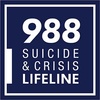Main navigation
Student resources
What do you mean by "mental health"?
Mental health refers to our emotional, psychological, and social well-being. It impacts how we think and feel, our relationships and how we relate to others, our abilities to adapt and cope with stress, and our sense of purpose and quality of life. There are many factors that affect our mental health, and they range from biological to psychological to environmental (including social, economic, and physical environments/systems).
Poor mental health and/or mental health disorders are often due to a complex interaction of these factors. It is not a person’s fault or a sign of weakness; nearly one in five U.S. adults will experience mental illness in a given year. With help and support in their recovery, people can lead meaningful and satisfying lives.
When should I seek mental health services?
It can be tough to know when you should seek help. Here is a list of signs you can watch out for:
Feelings:
- Extreme highs and lows
- Prolonged sadness, irritability, anger
- Excessive fears, worries, and anxieties
- Tired and low energy
Thoughts:
- Suicidal thoughts
- Strange thoughts (delusions)
- Fixation on one thing
- Confused thinking
- Things not feeling real
Body changes:
- Unexplained physical ailments
- Unexplained weight loss or gain
- Sleep patterns
Behavior changes:
- Consequences due to substance use
- Not caring for yourself
- Disordered eating
- Inability to manage substance use
- Hearing or seeing things that aren't there
- Self-harm
Connections:
- Trouble connecting or relating to people
- Social withdrawal
- Skipping classes and/or work
What happens at my first appointment?
Prior to your first appointment, you will be asked to fill out some forms providing information about yourself and your concerns. During your appointment, the therapist will speak with you for about 50 minutes to learn more about your concerns, relevant history, and goals. Then you will have a collaborative discussion about what would be helpful next.
How will individual sessions be held?
Students have the choice to be seen in the office or by telehealth via Zoom. You will be asked your preference when you schedule your appointment,
During the time that tele-mental health services are provided you will be asked where you are currently located as part of the scheduling conversation. Each state has specific limitations set by that state about who can provide services to its residents.
What can I expect as far as confidentiality is concerned?
As a mental healthcare provider, the embedded therapist is legally and ethically required to uphold standards of confidentiality. This means the therapist cannot release any protected/privileged information to professors, advisors, parents, or concerned friends without the student’s prior written informed consent. It also prohibits the embedded therapist and UCS staff from confirming or disconfirming that a student has made an appointment or attended sessions without the student’s prior written permission.
UCS records are kept separately from medical records and academic records. There are narrow exceptions when confidentiality must be broken, and these are:
- When the student is in imminent danger of harm to self or others
- In order to protect minors and dependent adults from current potential abuse
- If court-ordered by a judge in a current legal proceeding. The UCS website provides further information about confidentiality.
To protect your confidentiality. the therapist will work with you to determine the best way for you to enter the therapeutic office with the least visibility.
Can I see a therapist at another location on campus?
Yes, we honor each student’s choice to have a therapist that is right fit for them. A student may prefer to see a therapist at a main campus location or with Housing and Dining (must meet eligibility) due to identity, location, availability, or other preferences.
Get help now

If you are experiencing an emergency or crisis, call 911 or contact:
GuideLink Center | Adult Mental Health and Substance Use Services: 319-688-8000
CommUnity: 1-855-581-8111
UIHC Emergency Treatment Center: 319-356-2233
UCS at 319-335-7294 between 8:00 a.m. and 5:00 p.m. to request a quick access or same-day appointment.
UI Support & Crisis Line - We're here for you any time, via chat, phone, or text. In partnership with CommUnity Crisis Services in Iowa City, the University of Iowa provides around-the-clock mental health crisis and support for all students.
